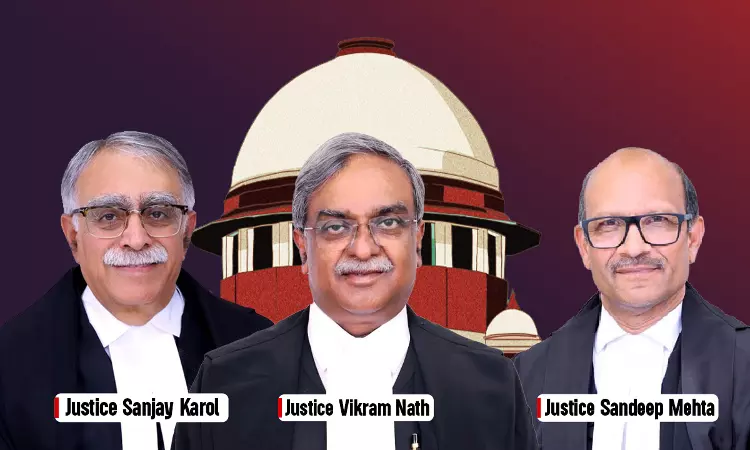- Home
- /
- Top Stories
- /
- Supreme Court Acquits Man Sentenced...
Supreme Court Acquits Man Sentenced To Death, Slams Trial Court's 'Hasty Enthusiasm' In Sending Accused To Gallows On Meagre Evidence
Gursimran Kaur Bakshi
16 July 2025 7:22 PM IST
"The Courts' enthusiasm to deliver justice in such a heinous crime ensures that the accused person ends up on the death row, albeit without sufficient evidence," the SC observed.
The Supreme Court today(July 16) acquitted a death penalty convict, who has suffered more than eleven years of incarceration, on the grounds that the prosecution could not prove the case beyond a reasonable doubt. The appellant was convicted of killing four members of the family, including his wife, sister-in-law and his two children below the age of five, in his village home in 2013, owing...
The Supreme Court today(July 16) acquitted a death penalty convict, who has suffered more than eleven years of incarceration, on the grounds that the prosecution could not prove the case beyond a reasonable doubt.
The appellant was convicted of killing four members of the family, including his wife, sister-in-law and his two children below the age of five, in his village home in 2013, owing to nursing a grudge against his family due to some financial dispute.
He was convicted to death by the Additional Sessions Judge, Kapurthala, in 2020, for falling under the 'rarest of rare' category, which was then upheld by the High Court of Punjab and Haryana in 2024.
Observing that the case of the prosecution has major contradictions in the testimonies, accompanied by glaring investigative defects, a bench comprising Justice Vikram Nath, Justice Sanjay Karol and Justice Sandeep Mehta reiterated that the standard of proof is absolutely strict and it cannot be compromised with.
"It is settled law that in order to record conviction based on ocular evidence, their testimonies have to be completely credible and trustworthy. However, in the present matter, where there are major contradictions in the testimonies of key prosecution witnesses accompanied by glaring investigative defects, it cannot be said that the prosecution has established the charge beyond reasonable doubt. At the cost of repetition, we must state that the standard of proof is an absolutely strict one and cannot be faltered with. When at stake are human lives and the cost is blood, the matter needs to be dealt with utmost sincerity. Therefore, given the facts and circumstances of the case and in light of the above discussion, we cannot bring ourselves to hold the accused-appellant guilty of the charged offence as his guilt has not been proved beyond a reasonable doubt."
The court has remarked that since the matter garnered some sensation, it put pressure on the investigation agencies to find the culprit, ultimately leading to a shoddy investigation. It equally blamed the trial court and the high court for their hasty decisions in delivering justice, because of which a man, against whom there is no sufficient evidence, ended up on death row.
"The breakdown of the legal system becomes apparent when such haste to lay a finger of blame on somebody leads to a shoddy investigation and a poorly conducted trial. The result is a loosely tied prosecution case with glaring loopholes all across and yet the Courts' enthusiasm to deliver justice in such a heinous crime ensures that the accused person ends up on the death row, albeit without sufficient evidence. This is precisely the misery which the instant case entails."
The Court found that the prosecution's case relies on the testimonies of the brother (complainant) of the Appellant's wife, the mother-in-law of the Appellant, and the Appellant's minor son, since the incident had happened in the complainant's house where her sister was residing after having left Appellant's house.
The complainant had alleged that he was present at the spot along with his mother, who was the eyewitness. However, these testimonies have major contradictions in terms of the presence of the complainant.
Further, as for the complainant's mother, the court finds contradictions in the testimony of the complainant who says her mother was in the Gurudwara, whereas, in her statement, she says she was hiding due to the fear of the Appellant. Additionally, the court found that while initially the complainant alleged that the Appellant was carrying 'datar,' later he changed it to 'gandasi'.
Lastly, none of the recoveries made by the prosecution, such as the weapon or the blood-stained clothes, were corroborated by independent witnesses.
Allowing the appeal, the judgment authored by Justice Nath set aside the final order and judgment of conviction passed by the High Court of Punjab and Haryana, as well as the trial court's judgment. It said that the trial court and the high court were grossly wrong in brushing aside these contradictions as 'minor' whereas, these were contradictions of material particulars.
"In the instant case, there are different versions of the same set of events which are being told by these witnesses at differing points of time, statements retracted and remoulded as per their convenience, wherein such difference in statements are leading to material alterations in the chain of events. As a result, the prosecution timeline and the fundamental details about the occurrence are not at all corroborated between its two key witnesses. Therefore, we observe that the contradictions in prosecution witnesses' testimonies, as pointed above, are major ones and carve a gaping hole in the prosecution's story altogether."
Yesterday, the Supreme Court had acquitted another death convict, citing faulty investigation.
Case Title: BALJINDER KUMAR@KALA v. STATE OF PUNJAB|CRIMINAL APPEAL NOS. 2688-2689 OF 2024
Citation : 2025 LiveLaw (SC) 711
Appearances: Senior Advocate Dama Seshadri Naidu, for Appellant, and Advocate Siddhant Sharma, for State of Punjab
The Square Circle Clinic, NALSAR University of Law, provided legal assistance to the appellant.



